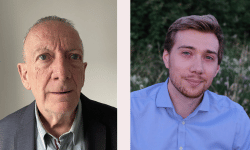Professor David Guile and Dr Benjamin Abrams, from IOE, UCL's Faculty of Education and Society, share their experience of embarking on a new kind of knowledge exchange project with Camden Council.
Involving students in knowledge exchange
David: As a teaching team, we’d been talking about ways to help our BSc Sociology students consolidate their research skills. We hit on the idea for a new work-based project module to give final year students the chance to conduct in-depth research ‘in the wild’ on behalf of an external organisation.
Going further than the traditional internship or employability skills project, the teams had the chance to shape their own research. They had to draw on relevant sociological theories, conduct in-depth interviews, and learn to work as a team.
Camden Council were the first partner to sign up, and they were so enthusiastic about the idea they committed to not just one project but two. The first centered on parks in Camden, and how the Council could make its parks more accessible to women. The second involved engaging with Camden’s young queer community, looking at how the Council could better serve the needs of that demographic.
Ben: The students had a lot of autonomy to design the projects how they wanted. They went out and built the trust needed to gather the perspectives of local residents and visitors to the borough, and then shaped that into concrete solutions the Council could use.
Given it’s the first year we’ve tried it, we’ve been blown away by the results. The students set out somewhat unsure of their abilities, and they’ve blossomed into these really confident communicators and researchers. Alongside that, the Council have ended up with some very high quality research that they’re now using to better serve the needs of different groups of people in the borough.
Support from UCL Innovation & Enterprise
David: The work-based project module was an idea that had been in development for several years. But in 2022 we started mapping it out more fully, and discussed it with the Business and Innovation Partnerships team in UCL Innovation & Enterprise. The team’s help was crucial in getting the idea off the ground and introducing us to the relevant people at the Council.
To make a project like this work there has to be good engagement from the outset, and from Camden’s perspective we had a lot of buy-in thanks to the trust already built up by the Partnerships team.
Our contacts could see the value of having these young, dynamic, UCL-trained researchers exploring issues they wanted to address. And the work our students have conducted has enabled them to reach underserved areas of the population.
In the case of the green spaces project, the student research is now helping to inform the Council’s case for change for its local parks. And in the night-time economy project, the solutions proposed are forming the backbone of the Council’s strategy for queer venues for local young people. So it hasn't just been a theoretical exercise, the students’ work is set to have a tangible impact in the local community.
More partners keen to be involved
Ben: We’re now talking to other partners about getting involved this coming year. In addition to having a ready-made research team to help them explore and address an issue they’re concerned about, we’ve made it clear they don't have to find desk space for the students. Once they have a remit, they go off to investigate it, and only attend for meetings. So it’s not resource heavy for them.
David: What’s important to emphasise, too, is that the way we organised this was very different from a classic employability skills project. Rather than working individually on applying their knowledge to a problem, the students had to work together as a team. They had to encounter problems and work through them. So they got to learn in multiple ways about how to manage themselves, about how to manage an outcome, and about how to communicate that to a wide range of audiences.
The result is that they’ve come away with this robust set of skills and experience they can take with them into their careers. We’re thrilled with that aspect in particular. We’ve added this level of ‘rich practical experience’ to enhance the sociological education we offer our students here at UCL, while also adding to the value we can offer our partners. It’s mutuality built in from the start which has made this project work so well.
Links
Find out more about:
 Close
Close


